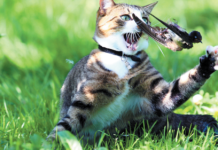[From Tufts July 2011 Issue]
We have a 2-year-old Siamese mix who we took in as a stray. All of our cats run and hide if the doorbell rings or we have visitors, but Winston is the worst. Recently when our son, wife and grandson came for an overnight visit, Winston dashed outside and would not come in.
We were finally able to usher him inside the garage, but he would not come into the house until several hours after our kids left. Is there any way we can get him to be more willing to accept house guests? Our other cats initially hide, but then act normal within a few minutes of guests’ arrival.
Marie and Fred Whitbourn
Dear Marie and Fred: The sensitive period for learning in cats is during the first seven weeks of life. Cats who are not exposed to people in a positive way during that period of time (for example, feral cats) are never really good with people though they can develop some reasonable bonds with some familiar individuals.
Basically, early in life, some cats miss the window of opportunity for critical social learning. You wind up with a cat who is, at best, somewhat anti-social and, at worst, positively fearful of strangers. That seems to be your situation with Winston and I have witnessed it before. Winston is the worst of your gang and appears to be something of a feline misanthrope who would rather hide away than face strangers.
The way to improve the situation is to attempt to show Winston and the others that strangers not only are innocuous, but also signal the advent of good things, particularly delicious food. To achieve this, it is first important to make sure that Winston and the others are not able to escape from the house during visits by friends or family while also instructing visitors not to encroach on him in any way. Basically, they should ignore him, not look at him, not talk to him, not pet him, and certainly not attempt to put him on their laps.
Next, highly aromatic and delicious food can be added to the equation. Perhaps canned tuna, the opening of a can of which will provide an auditory signal to Winston that a delicious dinner is about to be served. The serving may initially have to be closer to Winston than to the visitors but, as time goes by or during subsequent visits, the food can be presented closer to the guests.
Finally, to speed up this process, it is possible to alleviate some cats’ anxieties with the mild anxiolytic medication called buspirone. Under the influence of this medication, even feral cats become less shy and more social and thus more easily coaxed out of their shell (so to speak). If you would like to take the latter version, you should speak to your veterinarian as buspirone is a prescription medicine.
Nicholas Dodman, BVMS
Animal Behavior Clinic Director
Cummings School of Veterinary Medicine
at Tufts University



